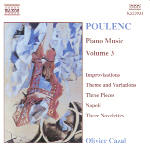Poulenc’s piano music contains three principal elements: dry, toccata-like brittleness, salon-like frivolity, and sex. In case you have any doubt about this last quality, check out this comment concerning the composition of his opera La Voix humaine: “It’s a secret, but I’ve found all my themes. Two are incredibly erotic…” (see Benjamin Ivry: Francis Poulenc, p. 202). Well, Olivier Cazal excels at toccata-like brittleness, and he’s not bad at salon-like frivolity, but on evidence of this third volume of his survey of the complete piano works, his libido is definitely in neutral. He’s best in the fast, snazzy pieces such as the Third Improvisation or the Second Novelette (both of which recall the finale of the Concerto for Two Pianos). Elsewhere, as in Poulenc’s languid, smoky homage to Manuel de Falla that closes the series of Novelettes, or in the dreamier parts of the Theme and Variations, he’s either too hasty or unconvincingly mannered. Make no mistake; Cazal’s got the technique, and a lot of this music plays to his strengths. It’s style that he lacks, and this prevents him from entering fully into Poulenc’s fanciful, eclectic, sensual musical world. The sound, like the performances, is bright and a touch metallic.
































